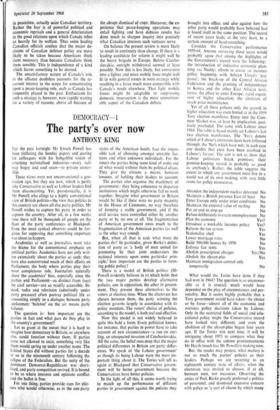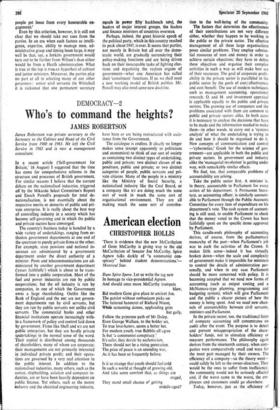The party's over now
DEMOCRACY-1
ANTHONY KING
For the past fortnight Mr Enoch Powell has been titillating the Sunday papers and scaring his colleagues with his hobgoblin vision of returning nationalised industries—every rail- way bogey and coal seam—to private owner- ship.
These views were not unconventional a gen- eration ago, but they are now, which is partly why Conservative as well as Labour leaders find them disconcerting. Yet, paradoxically, it is Mr Powell who clings to a highly conventional view of British politics—the view that politics in this country are above all else party politics. Mr Powell wishes to capture his party in order to capture the country. After all, in a few weeks time there will be thousands of people on the floor of the party conferences at Blackpool. Even the most cynical observer could be for- given for supposing that something important was about to happen.
Academics as well as journalists must take the blame for the conventional emphasis on political parties. Academics have not only writ- ten extensively about the parties as such; they have also concentrated much of their efforts on Parliament, the body where parties play their most conspicuous role. Journalists naturally share the academics' bias, especially since the parties and Parliament—as distinct from (say) the civil service—are so readily accessible. In- deed, radio and television (admittedly under party pressure) often portray political life as amounting simply to a dialogue between party spokesmen; 'balance' on the air means party balance.
The question is : how important are the parties in fact and what part do they play in the country's government?
Let us grant at the outset that it is hard to imagine how democracy in Britain, or anywhere else, could function without them. If parties were not allowed to exist, something very like them would spring up under another name. The United States did without parties for a decade or so in the nineteenth century following the eclipse of the Federalists. But the unity of the dominant Democrat-Republicans was short- lived, and party competition revived. It is boind to be so where interests and opinions conflict and the ballot is free.
For one thing, parties provide cues for elic- tors who would otherwise, as in the one-party states of the American South, face the impos- sible task of choosing amongst unstable fac- tions and often unknown individuals. For the voters the parties bring some kind of order out of what would without them be political chaos. They give the citizens a means, however tenuous, of holding their leaders to account.
The parties also organise the machinery of government: they bring coherence to disparate institutions which might otherwise fail to work together. Imagine what government in Britain would be like if there were no party majority in the House of Commons, no way therefore of forming a stable government, and if the civil service were controlled either by another party or by no one at all. The fragmentation of American government owes much to the fragmentation of the American parties (as well as the other way round).
But, when all that is said, what more do parties do? In particular, given Burke's defini- tion of party as 'a body of men united for promoting by their joint endeavours the national interests upon some particular prin- ciple,' how important are the parties in form- ing public policy? There is a model of British politics (Mr Powell evidently believes in it) which holds that the two major parties develop alternative policies, one in opposition, the other in govern- ment. They present these alternatives to the voters at election time. When the electorate has chosen between them, the party winning the election governs largely in accordance with its policy mandate. The voters' choice of policies, according to the model, is both real and effective.
Now this model is not widely believed in quite this bald a form. Every politician knows, for instance, that parties in power have to take account of new circumstances—a run on ster- ling, an unexpected invasion of Czechoslovakia. All the same, the belief runs deep that the major political differences in Britain are party differ- ences. We speak of 'the Labour government' as though its being Labour were the most im- portant thing about it. The Tories will tell us again at Blackpool that Conservative govern- ment will be better government because the Conservatives have better policies.
In the light of all this, it seems worth trying to match up the performance of different parties in government against the policies they brought into office, and also against how the other party would probably have behaved had it found itself in the same position. The record of recent years leads, at the very least, to a certain amount of head-scratching. Consider the Conservative performance 1959-64. Anyone surveying those years would probably agree that among the highlights of the Government's record were the following: the introduction of indicative economic plan- ning via Neddy; efforts to create an incomes policy beginning with Selwyn Lloyd's 'pay pause'; the break-up of the Central African Federation and the granting of independence to Kenya and the other East African terri- tories; the effort to enter Europe; rapid expan- sion of higher education; the abolition of resale price maintenance.
Yet of all these policies only the growth in higher education was even hinted at in the 1959 Tory election manifesto. Entry into the Com- mon Market was, at least by implication, posi- tively precluded. The same with Labour since 1964. The table is based mainly on Labour's last two election manifestoes. The 'Yes's denote which of Labour's intensions have been followed through, the `No's which have not; in each case any doubts that exist have been resolved in Labour's favour. The aim is not to show that Labour politicians break promises; their promise-keeping record is probably as good as anybody's. Rather, the table suggests the extent to which any government must live in a world not of its own making, with very little room for policy manoeuvre.
Abandon the independent nuclear deterrent No Maintain a British presence East of Suez No Enter Europe only under strict conditions No Maintain the external value of sterling No Put an end to stop-go No Refuse deliberately to create unemployment No Plan the economy Yes?
Introduce a workable incomes policy Yes?
Reform the tax system Yes Nationalise steel Yes Lower mortgage rates No Build 500,000 houses by 1970 No Enforce fair rents Yes Abolish prescription charges Yes/No Abolish the eleven-plus Yes Maintain immigration control only temporarily No
What would the Tories have done if they had won in 1964? The question is as unanswer- able as it is crucial; much would have depended on the play of circumstances and per- sonality. But it seems highly probable that a Tory government would have taken—by choice or by force—almost all of the economic and overseas policy decisions taken by Labour. Only in the restricted fields of social and edu- cational policy might the Conservative record have looked very different, and even the abolition of the eleven-plus began four years ago. If the Tories win next time, it will be intriguing about 1973 to compare what they do in office with the solemn pronouncements Mr Heath (much less Mr Powell) is making now.
But, the reader may protest, what matters is not so much the parties' policies as their leaders. Perhaps we are reverting to an eighteenth century state of affairs, when the electorate was invited to choose, if at all, between men, not measures. Observing the antics of Peel, Burke greatly preferred a politics of personnel, and dismissed excessive concern with policy as 'a sort of charm by which many people get loose from every honourable en- gagement' Even by this criterion, however, it is still not clear that we should take our cues from the parties. In an era when such factors as intelli- gence, expertise, ability to manage men, ad- ministrative grasp and timing loom large, it may well be that, say, a Jenkins government would turn out to be further from Wilson's than either would be from a Heath administration. What is true at the top is true-ex hypothesi of cabinet and junior ministers. Moreover, the parties play no part at all in selecting many of our other governors: senior civil servants (in Whitehall it is reckoned that one permanent secretary equals is power fifty'. backbench hes), the leaders of major interest • groups, the leaders and finance ministers of countries overseas.
Perhaps, indeed, the great historic epoch of the political party, which in this country reached its peak about 1945, is over. It seems that parties, not merely in Britain but all over the demo- cratic world, are gradually surrendering their policy-making functions and are being driven back on their inescapable tasks of fighting elec- tions and organising the various organs of government—what one American has called their 'constituent' functions. If so, we shall need a new working model of British politics. Mr. Powell may also need some new doctrine.











































 Previous page
Previous page